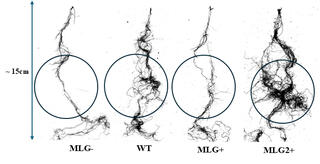Increased MLG in engineered grasses changes roots, may affect soil carbon processing

Background/Objective
Researchers are pursuing efforts to design grasses with elevated levels of cell wall carbohydrates, including mixed-linkage glucan (MLG), to improve their value as bioenergy feedstocks. Such genetic modifications affect aboveground growth biomass, but the impact on root system development, decomposition, and soil carbon are largely unexplored.
Approach
Researchers explored four Brachypodium lines with contrasting MLG production: wildtype; a loss-of-function mutant with low MLG; an overexpression line; and a line lacking enzymes for MLG degradation. Researchers assessed each for root physical characteristics; contents of C, N, MLG, soluble sugars, neutral sugar composition, and lignin; and impact of roots on soil C mineralization and microbial biomass C in soils from polyculture restored prairie and monoculture switchgrass.
Results
Findings demonstrated that genetic modifications affected above- and below-ground plant traits and MLG contents. MLG-overproducing strains exhibited elevated MLG concentrations across leaf, stem, and root tissues with notably high glucose and sucrose in the roots. Root incubation of high MLG-producing strains led to higher microbial biomass carbon and lower metabolic quotient compared to wild type, the latter indicating higher microbial efficiency. However, genotype effect on C mineralization was dependent on soil vegetation history, appearing in monoculture switchgrass soil but not polyculture prairie.
Significance/Impact
This is the first demonstration that strains engineered for higher MLG production also accumulate MLG in the roots, potentially affecting soil C cycling. Findings highlight the potential for engineered MLG-overproducing grasses to modify soil carbon processing and underscore the importance of root chemistry and soil legacy in evaluating their environmental performance.
Chakraborty, P., et al., Higher levels of mixed-linkage (1,3;1,4)-β-glucan in transgenic grasses may impact soil C processing. Soil Biology and Biochemistry, 210, 109946. (2025). [DOI:10.1016/j.soilbio.2025.109946]